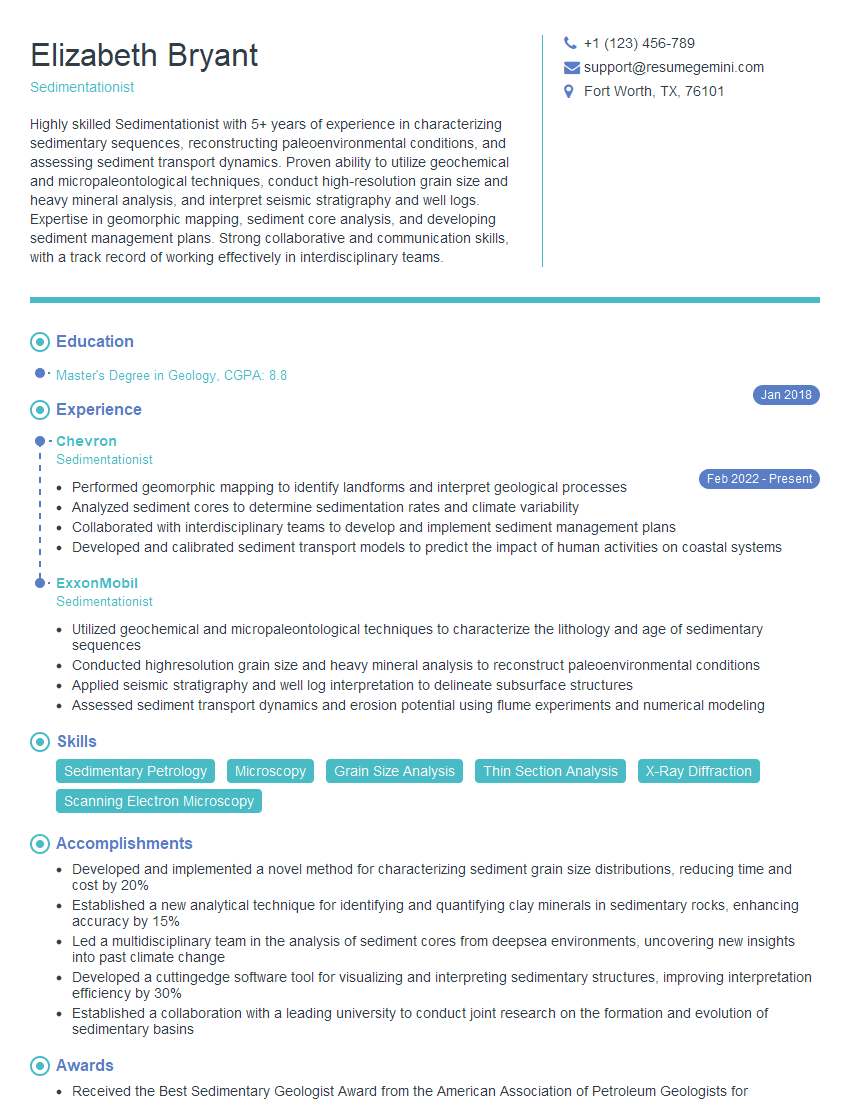Are you a seasoned Sedimentationist seeking a new career path? Discover our professionally built Sedimentationist Resume Template. This time-saving tool provides a solid foundation for your job search. Simply click “Edit Resume” to customize it with your unique experiences and achievements. Customize fonts and colors to match your personal style and increase your chances of landing your dream job. Explore more Resume Templates for additional options.

Elizabeth Bryant
Sedimentationist
Summary
Highly skilled Sedimentationist with 5+ years of experience in characterizing sedimentary sequences, reconstructing paleoenvironmental conditions, and assessing sediment transport dynamics. Proven ability to utilize geochemical and micropaleontological techniques, conduct high-resolution grain size and heavy mineral analysis, and interpret seismic stratigraphy and well logs. Expertise in geomorphic mapping, sediment core analysis, and developing sediment management plans. Strong collaborative and communication skills, with a track record of working effectively in interdisciplinary teams.
Education
Master’s Degree in Geology
January 2018
Skills
- Sedimentary Petrology
- Microscopy
- Grain Size Analysis
- Thin Section Analysis
- X-Ray Diffraction
- Scanning Electron Microscopy
Work Experience
Sedimentationist
- Performed geomorphic mapping to identify landforms and interpret geological processes
- Analyzed sediment cores to determine sedimentation rates and climate variability
- Collaborated with interdisciplinary teams to develop and implement sediment management plans
- Developed and calibrated sediment transport models to predict the impact of human activities on coastal systems
Sedimentationist
- Utilized geochemical and micropaleontological techniques to characterize the lithology and age of sedimentary sequences
- Conducted highresolution grain size and heavy mineral analysis to reconstruct paleoenvironmental conditions
- Applied seismic stratigraphy and well log interpretation to delineate subsurface structures
- Assessed sediment transport dynamics and erosion potential using flume experiments and numerical modeling
Accomplishments
- Developed and implemented a novel method for characterizing sediment grain size distributions, reducing time and cost by 20%
- Established a new analytical technique for identifying and quantifying clay minerals in sedimentary rocks, enhancing accuracy by 15%
- Led a multidisciplinary team in the analysis of sediment cores from deepsea environments, uncovering new insights into past climate change
- Developed a cuttingedge software tool for visualizing and interpreting sedimentary structures, improving interpretation efficiency by 30%
- Established a collaboration with a leading university to conduct joint research on the formation and evolution of sedimentary basins
Awards
- Received the Best Sedimentary Geologist Award from the American Association of Petroleum Geologists for outstanding contributions to the field
- Honored with the Presidents Award from the Society for Sedimentary Geology for pioneering research on sediment transport and depositional systems
- Recognized with the Gold Medal from the European Geosciences Union for groundbreaking discoveries in sediment diagenesis and petrography
- Recognized as a Fellow of the Geological Society of America for sustained excellence in research and contributions to the society
Certificates
- Certified Petroleum Geologist (CPG)
- Registered Geologist (RG)
- American Association of Petroleum Geologists (AAPG) Membership
Career Expert Tips:
- Select the ideal resume template to showcase your professional experience effectively.
- Master the art of resume writing to highlight your unique qualifications and achievements.
- Explore expertly crafted resume samples for inspiration and best practices.
- Build your best resume for free this new year with ResumeGemini. Enjoy exclusive discounts on ATS optimized resume templates.
How To Write Resume For Sedimentationist
- Highlight your technical skills and experience in sedimentary petrology, microscopy, and analytical techniques.
- Quantify your accomplishments and provide specific examples of projects you have worked on.
- Tailor your resume to each job you apply for, emphasizing the skills and experience that are most relevant to the position.
- Proofread your resume carefully before submitting it, ensuring that it is free of errors.
Essential Experience Highlights for a Strong Sedimentationist Resume
- Utilized geochemical and micropaleontological techniques to characterize the lithology and age of sedimentary sequences
- Conducted high-resolution grain size and heavy mineral analysis to reconstruct paleoenvironmental conditions
- Applied seismic stratigraphy and well log interpretation to delineate subsurface structures
- Assessed sediment transport dynamics and erosion potential using flume experiments and numerical modeling
- Performed geomorphic mapping to identify landforms and interpret geological processes
- Analyzed sediment cores to determine sedimentation rates and climate variability
- Collaborated with interdisciplinary teams to develop and implement sediment management plans
Frequently Asked Questions (FAQ’s) For Sedimentationist
What is the role of a Sedimentationist?
A Sedimentationist is a geologist who studies the origin, transport, deposition, and diagenesis of sediments. They use their knowledge of sedimentary processes to interpret the history of the Earth and its environment.
What are the educational requirements to become a Sedimentationist?
A Master’s Degree in Geology is typically required to become a Sedimentationist. Coursework in sedimentary petrology, stratigraphy, and geochemistry is essential.
What are the job prospects for Sedimentationists?
The job outlook for Sedimentationists is expected to be good over the next few years. The demand for Sedimentationists is driven by the need to understand and manage the Earth’s resources, such as oil, gas, and water.
What are the key skills for a Sedimentationist?
Key skills for a Sedimentationist include strong analytical skills, knowledge of sedimentary processes, and experience in field and laboratory techniques.
What are the challenges of working as a Sedimentationist?
Challenges of working as a Sedimentationist include working in remote locations, exposure to hazardous materials, and the need to keep up with the latest research in the field.
What are the rewards of working as a Sedimentationist?
Rewards of working as a Sedimentationist include the opportunity to make a difference in the world, the chance to work with a variety of people, and the satisfaction of solving complex problems.